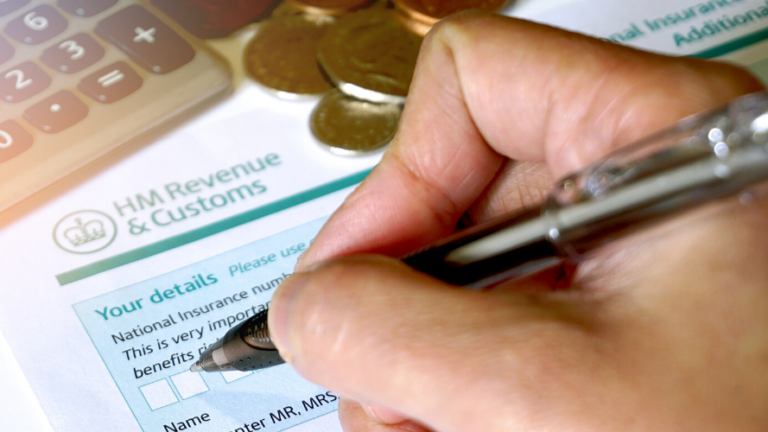As with all self-employed workers from various industries, sex workers are subject to Income Tax and National Insurance.
The tax status of sex workers has always been complex. It wasn’t until 2015 that the Government decided to start levying tax on those working in the sex industry.
It is therefore important to pay your Income Tax to avoid HM Revenue & Customs (HMRC) from billing you.
It’s important to stress that for some, financial taxes can be complicated. Be assured you are not alone.
Here at Vivastreet, we offer a simple guide for all self-employed sex workers who require support to help keep their finances in order, and importantly keep yourself and your money safe.
Income Tax and National Insurance explained
Before you read the guide below to understand how tax works, it is important that you first register with HMRC (Her Majesty’s Revenue & Customs) here.
You do not need to register before you officially start work (you can register to do this at any time up to October 5th of your business’s second tax year).
This means if you first undertake self-employed work in May 2021, you will have until the following year October 2022 to register as a sole trader with HMRC.
Tip: The tax year runs from 6 April one year to 5 April the following year. If you register too late you might be liable to pay penalties. HMRC advise that you register as soon as possible.
Income Tax
In contrast to workers of a company, who receive payslips and will have their income tax automatically deducted, as a self-employed sex worker you will be responsible for calculating your own income tax.
This amount is then paid to HMRC by way of your annual tax return.
Need help with working out your Income Tax? Work out your annual tax bill by using this income tax calculator below.
The figure left will be the one you’re taxed on. HMRC will expect this amount to be paid when you submit your tax return.
How much Income Tax to pay
The amount of income tax you pay will depend on:
- The amount your income is above your Personal Allowance (more on Personal Allowance can be found below).
- How much your income falls within a specific tax band
Personal Allowance
You are entitled to a tax-free personal allowance of £12,500 per year (the amount of income you won’t have to pay tax on).
The below table highlights the tax rates you will be expected to pay within each band, depending on the amount that you earn.
| Band | Taxable income | Tax rate |
| Personal Allowance | Up to £12,570 | 0% |
| Basic Rate | £12,571-£50,270 | 20% |
| Higher Rate | £50,271 – £150,000 | 40% |
| Additional Rate | Over £150,000 | 45% |
Source: gov.uk, January 2022
National Insurance
National insurance counts towards your pension. If you are self-employed, HMRC will use a yearly guideline to determine your class category.
Note: The class you fall under will depend on your employment status and how much you earn.
As a self-employed sex worker, you will be classified as Class 2.
You may also be eligible to pay voluntary contributions to add to your pension. To find out if you are eligible and how it works click here.
This article we will not cover VAT (Value Added Tax), as it is not something that affects sex workers in most cases.
How to become a self-employed sex worker
- If you aren’t already then register yourself for self-assessment by creating a Government Gateway account. Doing so will ensure that you are registered legally with HMRC for self-assessment and Class 2 National Insurance contributions.
- Use your ID and password provided to you, and sign in to this page.
- Next, register as self employed for Self-Assessment tax. Here you will be asked to choose your category (sole trader is the one you should select).
- Next, add the date you began – ie the day you started working as self-employed and was paid.
- HMRC will require you to hand over information regarding your start date, NI number, address/contact details, and other details related to your self employed status.
- In this step, it’s important to be aware that you will be asked what work you do. This is to ensure HMRC can make sure you are taxed correctly. Here you will only need to provide them with a basic summary.
Tip: You do not have to disclose your profession as a sex worker when you register with HMRC. Alternative titles such as masseuse or entertainer are acceptable.
7. Thoroughly check over all your information to ensure it is correct, then submit.
8. Once your application has been received by HMRC, you’ll then receive your UTR, which is a Unique Taxpayer Reference (a 10-digit code). You will use this for all tax payments, including VAT.
9. Doing the above, along with being enrolled for Self-Assessment, will mean that you’re officially employed.
Congratulations – You’re now self-employed.
Submitting your Tax Returns
Once you have registered, you will be required to fill in and submit a Tax Return form every year. All completed tax forms are due in by 31st January each year online. For those still filling by paper, it’s earlier with a 31st October deadline.
Tip: Though you will receive reminders, it’s your responsibility as a self-employed worker to meet these deadlines.
When your tax return has been calculated, it should then be filed with the payments preferably made at the same time. If not, you do have until the 31st of January once again to make such payments.`
HMRC will always send confirmation upon receipt of your tax return and payment while confirming that the correct amount has been calculated and paid.
Such documentation is your proof that the tax year in question has been completed and paid successfully and should be filed away for future reference.
Tip: Many sex workers will consider the tax rates for each tax year beforehand and work to regularly put aside a small amount to cover their final bill.
Doing the above will mean it doesn’t become problematic when the tax return is due to be paid.
HMRC provides a calculator to help determine such estimated costs, and how much to set aside each month.
Ensure that you get into the habit of keeping good records. Whether it’s on a notepad, your phone, or even on a spreadsheet, log everything you receive as income as well as everything that you spend for your job.
This includes the dates and details of all transactions. Keep all receipts where possible or create your own invoices. This is essential if you want to claim for items on your tax form.
Having such a visible system also allows you to have something to show to HMRC, in the rare event of them requiring further information later on.
For best practice, HMRC suggests all documentation relating to each tax return should be kept for five years afterwards.`
Tip: Keeping this documentation could be proof of your UK residence if you are not a UK citizen, and could potentially help with your settled status.
What happens if you don’t pay your taxes
Any person working and earning who doesn’t pay the necessary taxes will find themselves at the mercy of the tax office at some point in time.
HMRC now have ever-increasing powers to fine for activities such as:
- Late tax return submissions
- Incorrect information given on forms
- Non-declaration of profit
Accessing further advice on sex worker taxes
Fortunately, there are many places that sex workers can refer to for further help regarding their taxes and overall finances.
As well as HMRC, you can find practical and no-nonsense tax guidance online, as well as obtaining money advice from services that work closely with the sex industry on such matters.
Make your tax bill a priority when self-employed
Doing your taxes may seem daunting at first, but you don’t need to feel afraid.
The good news is that most sex workers find the HMRC to be respectful and behave towards them in a non-judgemental way.
It’s worth getting into the habit of recording all your income and expenditure regularly. This way, you’ll find the subject of tax less stressful when it comes to submitting your annual tax return.
Sources for further reading
https://www.release.org.uk/
https://saafe.info/
http://www.mash.org.uk/
https://www.gov.uk/





